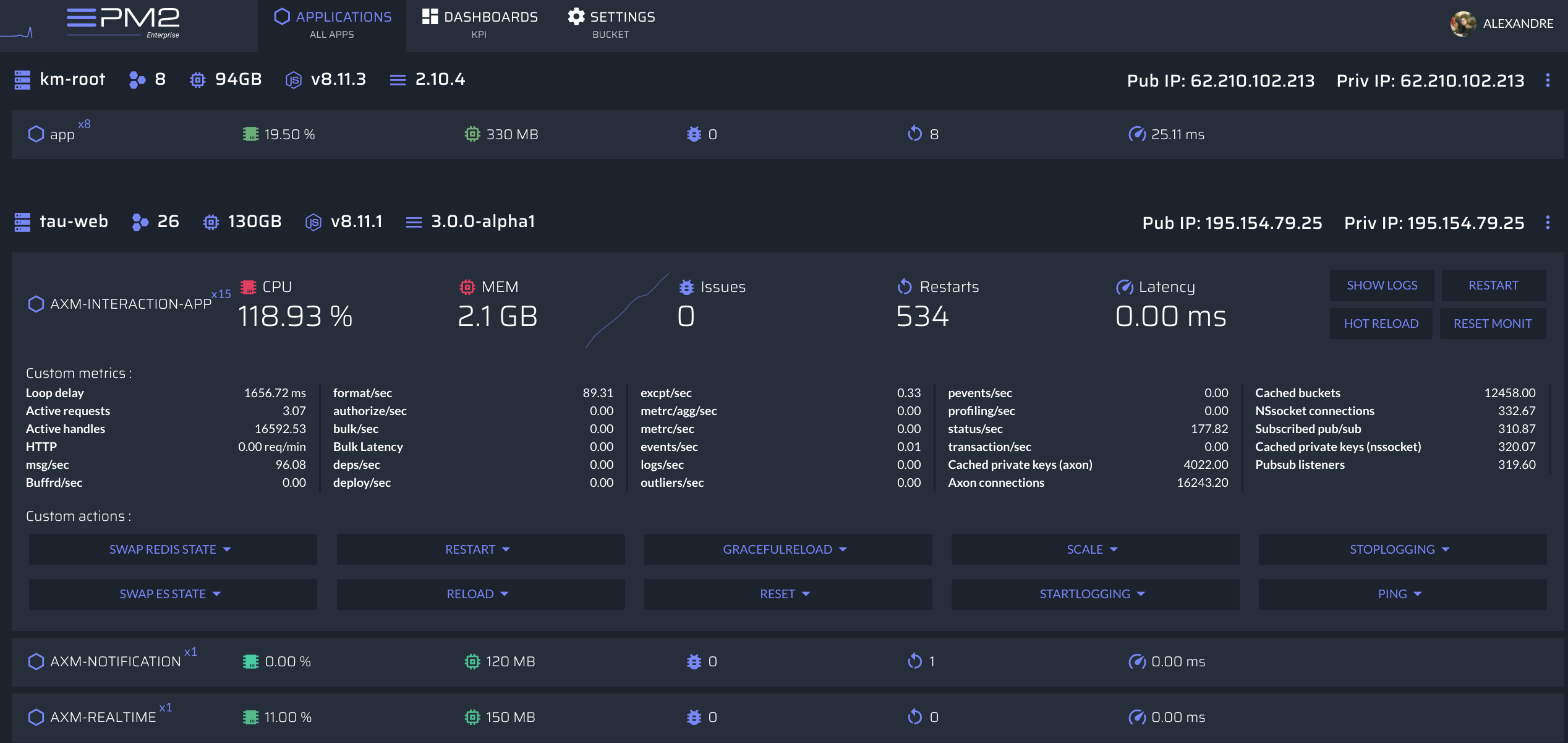PM2 is a Production Runtime and Process Manager for Node.js applications with a built-in Load Balancer. It allows you to keep applications alive forever, to reload them without downtime and facilitate common Devops tasks.
Starting an application in production mode is as easy as:
$ pm2 start app.jsPM2 is constantly assailed by more than 1800 tests.
Official website: https://pm2.io/doc/
Works on Linux (stable) & macOS (stable) & Windows (stable). All Node.js versions are supported starting Node.js 4.X.
$ npm install pm2 -gnpm is a builtin CLI when you install Node.js - Installing Node.js with NVM
You can start any application (Node.js, Python, Ruby, binaries in $PATH...) like that:
$ pm2 start app.jsYour app is now daemonized, monitored and kept alive forever.
With the drop-in replacement command for node, called pm2-runtime, run your Node.js application in a hardened production environment.
Using it is seamless:
RUN npm install pm2 -g
CMD [ "pm2-runtime", "npm", "--", "start" ]
Read More about the dedicated integration
Once applications are started you can manage them easily:
To list all running applications:
$ pm2 listManaging apps is straightforward:
$ pm2 stop <app_name|id|'all'|json_conf>
$ pm2 restart <app_name|id|'all'|json_conf>
$ pm2 delete <app_name|id|'all'|json_conf>To have more details on a specific application:
$ pm2 describe <id|app_name>To monitor logs, custom metrics, application information:
$ pm2 monitMore about Application Management
The Cluster mode is a special mode when starting a Node.js application, it starts multiple processes and load-balance HTTP/TCP/UDP queries between them. This increase overall performance (by a factor of x10 on 16 cores machines) and reliability (faster socket re-balancing in case of unhandled errors).
Starting a Node.js application in cluster mode that will leverage all CPUs available:
$ pm2 start api.js -i <processes><processes> can be 'max', -1 (all cpu minus 1) or a specified number of instances to start.
Zero Downtime Reload
Hot Reload allows to update an application without any downtime:
$ pm2 reload allSeamlessly supported by all major Node.js frameworks and any Node.js applications without any code change:
More informations about how PM2 make clustering easy
Monitor all processes launched straight from the command line:
$ pm2 monitTo consult logs just type the command:
$ pm2 logsStandard, Raw, JSON and formated output are available.
Examples:
$ pm2 logs APP-NAME # Display APP-NAME logs
$ pm2 logs --json # JSON output
$ pm2 logs --format # Formated output
$ pm2 flush # Flush all logs
$ pm2 reloadLogs # Reload all logsPM2 can generates and configure a Startup Script to keep PM2 and your processes alive at every server restart.
Init Systems Supported: systemd, upstart, launchd, rc.d
# Generate Startup Script
$ pm2 startup
# Freeze your process list across server restart
$ pm2 save
# Remove Startup Script
$ pm2 unstartup# Install latest PM2 version
$ npm install pm2@latest -g
# Save process list, exit old PM2 & restore all processes
$ pm2 updatePM2 updates are seamless
$ pm2 plusOnce you scale you need to make sure that your application is running properly, without bugs, performance issues and without downtimes.
That's why we created PM2 Plus. It's a set of advanced features for both hardening the PM2 Runtime and monitoring applications in production.
With PM2 Plus you get:
- A Real-time Monitoring Web Interface
- Smart Exception Reporting
- Production Profiling for Memory and CPU
- PM2 Runtime High Availability Fallback
And much more like realtime logs, custom metrics, remote actions...
You can also create account via the app: here
Visual Memory Snapshots:
CPU FlameGraphs:
Multi Server Overview:
To get more insights on how your application behave, plug custom metrics inside your code and monitor them with the pm2 monit command:
In your project install pm2-io-pm:
$ npm install @pm2/io --saveThen plug a custom metric:
const io = require('@pm2/io');
let counter = 1;
const latency = io.metric({
name : 'Counter',
value : function() {
return counter;
}
});
setInterval(() => {
counter++;
}, 1000);PM2 embeds a simple and powerful module system. Installing a module is straightforward:
$ pm2 install <module_name>Here are some PM2 compatible modules (standalone Node.js applications managed by PM2):
pm2-logrotate automatically rotate logs and limit logs size
pm2-server-monit monitor the current server with more than 20+ metrics and 8 actions
PM2 is made available under the terms of the GNU Affero General Public License 3.0 (AGPL 3.0). For other licenses contact us.









